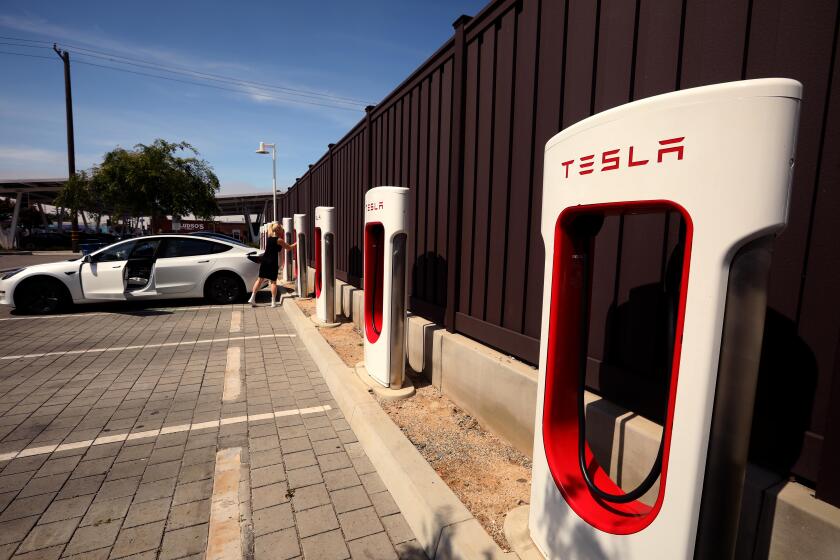Toyota’s Lexus Plans a Redesign of Its Lineup
When Toyota Motor Corp. rolled out its Lexus brand 15 years ago, rival auto executives snickered at the prospect of a Japanese automaker hitting it big in the tough U.S. luxury-car market.
The doubters were asleep at the wheel. By 2000, Lexus had shot past the Americans and Europeans to become the bestselling luxury auto brand in the nation.
Now Lexus’ challenge is to avoid the complacency that toppled other luxury leaders during its ascent.
The brand built its success with a reputation for reliability, consistently placing in the top ranks of customer satisfaction surveys.
“They have become successful because of bulletproof reliability and durability, great customer service and because they went for the sweet spot of the market with [softer] American ride and handling,” said automotive market analyst Jim Hossack of Tustin-based AutoPacific Inc.
Lexus also astutely targeted a customer base of baby boomers entering their peak earning years.
But rivals sell to the same crowd of fiftysomethings. And in recent years General Motors Corp.’s Cadillac, BMW and DaimlerChrysler’s Mercedes-Benz all have done a better job of attracting the more serious automotive enthusiasts among boomers by offering models with bigger engines, faster acceleration, stiffer handling and more daring styling.
“Lexus is the most conservative of the luxury brands,” said Jeff Schuster, senior director of global forecasting at J.D. Power & Associates, the Westlake Village automotive market research firm. “They are facing more challenges from competitors hoping to knock them down, so they cannot afford to let up.”
Dennis Clements, 59, head of U.S. operations for Lexus, part of Toyota Motor Sales USA in Torrance, acknowledges that the brand’s core market of aging boomers “is not a good one to build an image in.”
To keep the marque fresh and draw younger buyers, Lexus is redesigning its entire lineup over the next four years. “You’ll see sportier cars, more powerful cars and trucks, [with] a wider range of engines,” he said.
First up early next year is the RX 400 sport utility, the nation’s first luxury gas-and-electric-powered hybrid vehicle.
Unlike Toyota’s popular gas-miserly Prius compact, the RX 400 will be all about power and performance. An electric motor will augment a six-cylinder gas engine, boosting power from 230 horsepower in the current RX 330 model to 270 hp in the hybrid. The hybrid RX, with a base price expected to top $45,000, also will be equipped with a new electronic stability system.
Next will be redesigned Lexus GS sedans, with all-wheel-drive options, out in the spring.
Convertible and coupe versions of Lexus’ sportiest car, the IS 300 sedan, are due as 2006 models, with a new Lexus sport wagon styled like a lower, leaner SUV expected in 2007. The wagon is the first of a series of new crossovers -- wagon or SUV styles built on conventional passenger car platforms -- that Lexus is planning, Clements said. Many will be offered both as conventional gasoline-engine vehicles and as hybrids.
All-wheel drive will also become an option on most Lexus vehicles. And an electronic stability control system that the company claims is far ahead of anything now available will debut next year.
“We intend to give our buyers best-in-class performance at all levels,” Clements said.
This year Lexus has kept its top spot in the U.S. luxury market. It sold 188,693 cars and trucks through August, up 14.9% over the same period last year.
Lexus’ competitors are trying hard to catch up.
BMW remains in second place this year with sales of 169,480 vehicles, a 4.7% gain. And GM’s Cadillac division is closing in fast with an onslaught of new models: the Escalade and SRX sport utility vehicles, the CTS coupe and the XLR. The new offerings helped boost Cadillac’s vehicle sales to 149,683 through August, up 10.7%.
“Lexus, in a very quiet way, is a competitor with ruthlessly applied high standards,” Cadillac spokesman Jeff Kuhlman said. “Our objective isn’t volume leadership. That gap is pretty big. What we are working to reestablish is image superiority.”
For all the new Lexus models in the works, Clements talks a lot about the need to add a flagship vehicle priced at around $100,000.
It could be a four-door sedan to compete with Mercedes-Benz’s big S-Series sedan (the top-end model costs about $122,000), and BMW’s redesigned 7-Series (around $117,000). Mercedes, Clements points out, has a dozen models that sell for $70,000-plus, “while at Lexus we have none.”
A $100,000 Lexus wouldn’t be a volume leader for the company but would help bolster its image, said analyst Hossack.
Lexus may also introduce a high-performance hybrid sports car that would wildly expand the boundaries of the hybrid genre, he said.
Besides the new models, Toyota has pressed its Lexus dealers to maintain their high reputation for service. Nationally, Lexus dealers have spent close to $800 million in the last year adding repair bays and technicians to keep pace with the brand’s sales growth.
At Tustin Lexus, the nation’s first Lexus dealership, general manager Mike D’Amato has started a night shift in his crowded service department so that customers can pick up their cars in the morning.
“They start at 5 p.m., and they stay until the day’s jobs are done. They’re often still there when I come in at 8 a.m.,” he said.
For all of Toyota’s success with Lexus in the U.S., overseas the brand is largely unknown. So Lexus is redoubling efforts in Europe, where sales have lagged well behind the European luxury brands since its introduction there in 1990. And next year the Lexus brand is being launched as a stand-alone luxury nameplate in Japan and China, the fastest-growing auto market.
Back in the U.S., though, Lexus is still expected to set the pace in the luxury market.
“We may be a lap ahead of the competition, but we act like we’re a lap behind,” Clements said. “That’s what makes us a tough competitor.”



